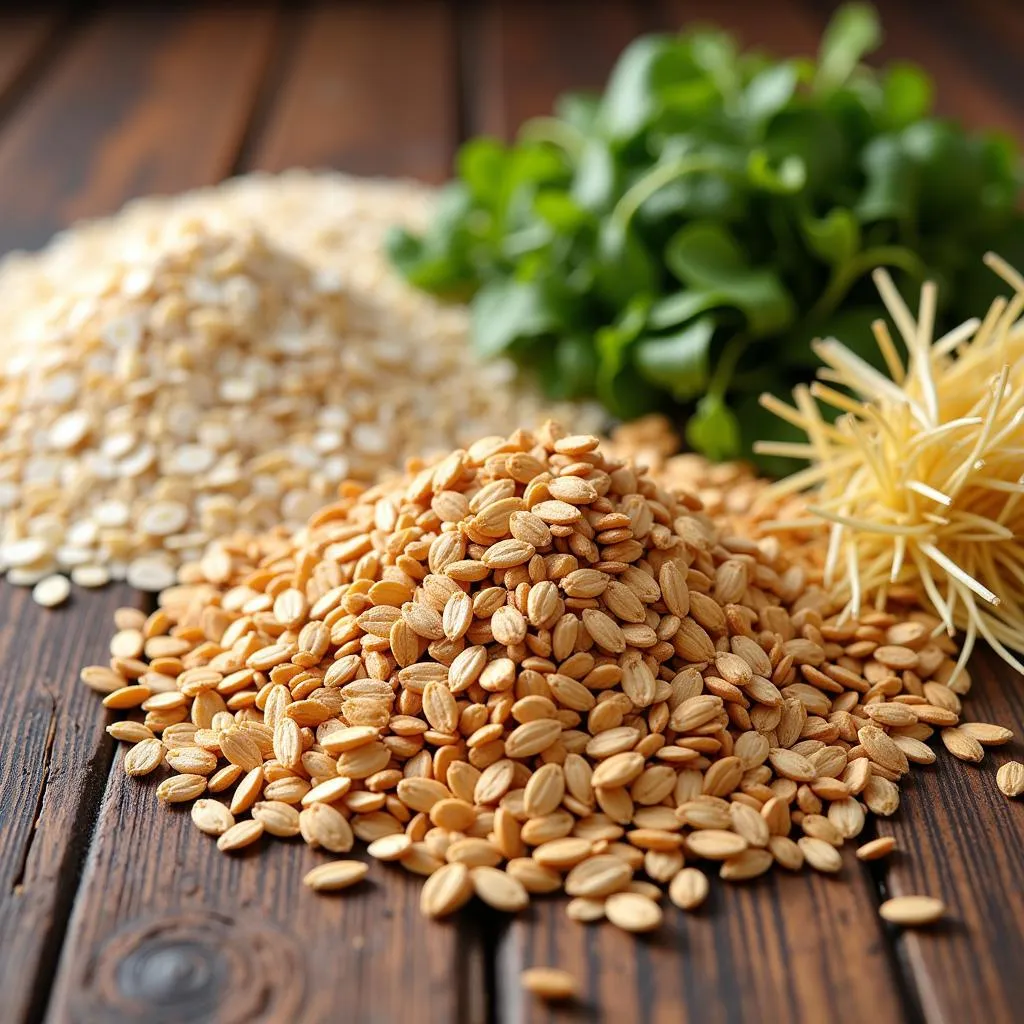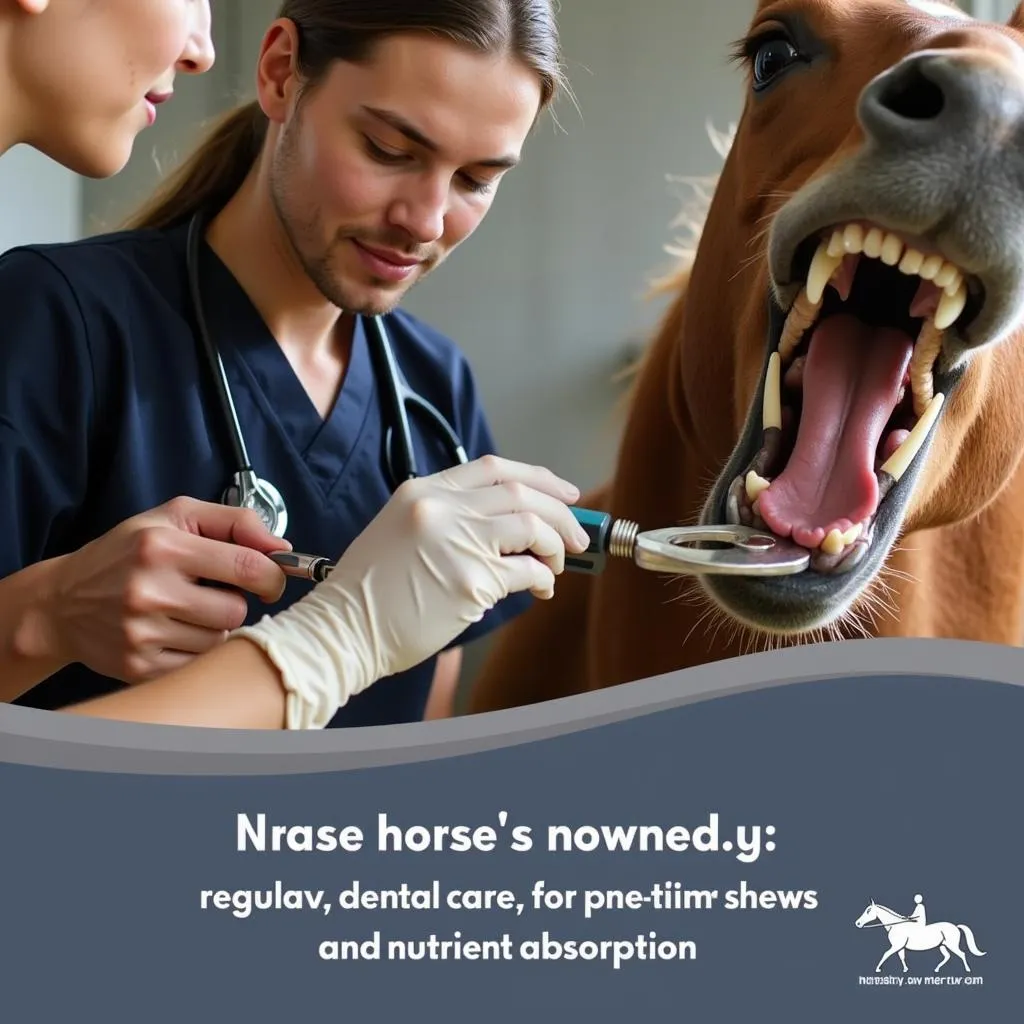Horse feed is the cornerstone of a horse’s health and performance. Just like humans, horses require a balanced and nutritious diet to thrive. Understanding the impact of horse feed is crucial for any horse owner, whether you’re caring for a champion racehorse or a beloved companion.
How Horse Feed Impacts Overall Health
The right horse feed provides the essential nutrients needed for a variety of bodily functions, including:
- Energy Production: Carbohydrates and fats in horse feed are broken down to provide energy for everything from basic metabolic functions to intense training sessions.
- Muscle Growth and Repair: Protein is vital for building and repairing muscle tissue, especially important for working horses or those recovering from injuries.
- Bone Health: Calcium, phosphorus, and vitamin D work together to support strong bones and prevent skeletal problems.
- Immune Function: A strong immune system relies on essential vitamins and minerals found in a balanced horse feed.
- Digestive Health: Fiber, a key component of forage, promotes healthy digestion and helps prevent digestive issues like colic.
Choosing the Right Horse Feed
With a wide variety of horse feeds available, selecting the right one can feel overwhelming. Consider these factors:
- Age: Growing horses have different nutritional needs than mature horses. Senior horses may require specialized feeds to address age-related health concerns.
- Workload: A horse used for light riding will have different energy requirements than a performance horse in intense training.
- Health Conditions: Horses with specific health conditions, such as Cushing’s disease or insulin resistance, benefit from specially formulated feeds.
- Forage Intake: The type and amount of hay or pasture a horse consumes will influence the type and amount of concentrate feed needed.
 Horse Feed Ingredients
Horse Feed Ingredients
Common Signs of Inadequate Horse Feed
Recognizing the signs of inadequate nutrition is essential for early intervention:
- Weight Loss or Gain: Sudden or unexplained changes in weight can indicate an imbalance in calorie intake or underlying health problems.
- Poor Coat Condition: A dull, rough, or patchy coat can be a sign of nutritional deficiencies.
- Lethargy and Reduced Performance: Lack of energy and decreased performance can indicate inadequate calorie or nutrient intake.
- Behavioral Changes: Irritability, nervousness, or wood chewing can be signs of nutritional imbalances.
- Digestive Upsets: Frequent diarrhea, colic, or changes in manure consistency can point to digestive issues potentially related to diet.
Maximizing the Impact of Horse Feed
Choosing the right horse feed is just the first step. Here’s how to ensure your horse gets the most from their diet:
- Feed by Weight, Not Volume: Use a scale to measure feed accurately, ensuring your horse receives the correct amount of nutrients.
- Provide Fresh, Clean Water: Water is essential for digestion and overall health. Ensure your horse has access to clean, fresh water at all times.
- Introduce New Feeds Gradually: Sudden changes in diet can disrupt the delicate balance of the horse’s digestive system.
- Monitor Hay Quality: Hay should be free of mold, dust, and weeds. The nutritional content of hay can vary, so testing is recommended.
- Consult with an Equine Nutritionist: For personalized guidance on your horse’s nutritional needs, consult with a qualified equine nutritionist.
 Veterinarian Checking Horse's Teeth
Veterinarian Checking Horse's Teeth
The Justus Horses USA Difference
At Justus Horses USA, we believe that informed horse owners make the best caretakers. We are committed to providing you with the knowledge and resources you need to make informed decisions about your horse’s nutrition.
Our APF horse supplement is formulated with a focus on enhancing your horse’s overall well-being. We understand that every horse is an individual, and we’re here to support you in creating a feeding plan that meets their unique needs.
Conclusion
The impact of horse feed on a horse’s health and well-being cannot be overstated. By understanding the importance of a balanced diet, choosing appropriate feeds, and implementing best feeding practices, you can help your horse thrive. Just like maintaining a healthy weight is important for humans, knowing the average weight of a quarter horse can help you tailor their diet for optimal health. Remember that a healthy horse starts from the inside out, and investing in quality horse feed is an investment in your horse’s overall well-being. Just as proper healthy hair care horse routines contribute to a horse’s well-being, proper nutrition forms the foundation for their overall health and vitality.
For all your equine needs and expert advice, contact Justus Horses USA today. We’re here to support you and your equine partner every step of the way.
Need Assistance?
Call: 0772127271
Email: [email protected]
Visit: QGM2+WX2, Vị Trung, Vị Thuỷ, Hậu Giang, Việt Nam
Our dedicated customer support team is available 24/7 to assist you!